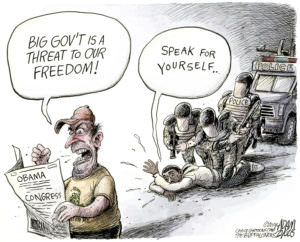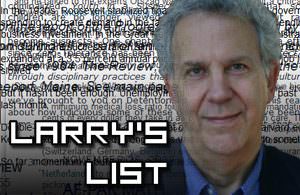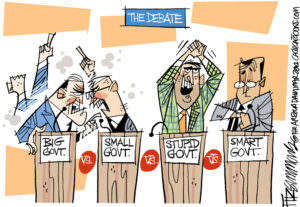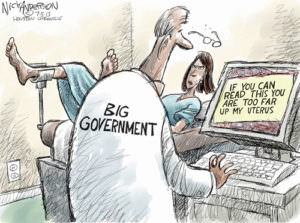Zachary Karabell on ‘The Case for Big Government’
Jeff Madrick’s new book insists that the anti-government ethos that is a treasured American prejudice is not grounded in the new economic reality. But is he fighting the last war?
With Congress passing a nearly $800 billion spending and tax-cut bill and with the Federal Reserve taking trillions onto its balance sheet, we are if nothing else plunging into a new era of big government. The extent of these actions would have been unthinkable even six months ago, and the scale of these measures — as well as the fact that they are probably the first of many — has taken many by surprise. Even those who have been advocating for years that the federal government play a more active role in addressing economic imbalances and inequalities could not have predicted or imagined what has happened of late.
It is both Jeff Madrick’s fortune and misfortune to have “The Case for Big Government” published in this climate. Madrick has for many years been a voice crying in the wilderness. His essays in The New York Review of Books in particular have been acerbic and astute critiques of the absurd and glaring inequities of modern American laissez-faire capitalism. Some of the current spending plans, as well as the ideological shift in Washington away from the dogmatisms of the past, are a vindication of much of what he has been championing for years.
Unfortunately for his book, however, events have somewhat overtaken him. While it’s likely that Madrick prefers reality to have changed even at the expense of his book sales, he is nonetheless a victim of timing. One obvious indication that events have overtaken his argument? He makes an impassioned case for government spending of 3 percent of GDP a year on a variety of social, employment and infrastructure programs, which would amount to about $400 billion a year. A year ago, that was a bold call that even he knew would be met with skepticism and resistance. Today, it is half of what Congress has just authorized.
Still, even though government spending has increased, it’s unclear that public attitudes about government have changed much. As Madrick notes, the past decades have been defined by “an ideological antagonism toward government.” While that was cemented most notably by Ronald Reagan, it became even more ingrained under centrist Democrats led by Bill Clinton, who famously declared the end of the era of big government. Yet, says Madrick, the central tenet of the anti-government argument — namely the belief that government impedes economic growth — has never been proved.
“If the case made that big government is detrimental to economic growth is as simple and unambiguous as some economists and political commentators claim it is … the statistical evidence should be easy to demonstrate and virtually impossible to refute.” Madrick points to Western Europe as well as periods in U.S. history in which there has been aggressive government intervention to show that, indeed, the argument against government rests more on ideology than fact.
Of course, that doesn’t mean that more government in and of itself creates growth, a fact which Madrick acknowledges. Sometimes it does, sometimes it doesn’t. Madrick spends a considerable portion of his brief book showing that there never was a “laissez-faire” ethos in the United States and that government has always been woven into the economy, a fact that should be obvious. That said, he is perhaps too quick to dismiss the strong anti-government currents that have coursed through the American past. It has never been either-or, and in seeking to show how involved government has always been, Madrick risks supplanting one caricature with another.
The heart of his argument is that the rise of income inequality in the United States was intimately connected to the waning of government and its delegitimization by conservatives. Particularly troubling has been the economic fate of men. “The U.S. economy no longer raises the income of workers the way it once did … and has profoundly affected the fortunes and prospects of males.” Madrick goes on to cite a litany of statistics about wage stagnation over the past three and a half decades, statistics that are familiar talking points on the left and dismissed as sour grapes on the right, especially since overall economic growth has been steady during this time (at least until now).
The issue as Madrick sees it lies with the harm that wage stagnation and declining standards of living do for the American dream. He adamantly rejects the notion that things like cars and televisions are luxuries and makes an effective case that they are in fact necessities that are required for one to be a full participant in contemporary American society. Furthermore, amid yawning gaps between rich and poor and the insecurity that tens of millions feel because of soaring health care costs and tenuous wages, there has been “an erosion of faith in American fairness” which threatens to undermine society.
It’s hard to argue with the sentiment, but there is something, well, sentimental about that perspective. The notion of an idyllic American dream that has been undermined takes a brief moment of the 1950s when all seemed well with the world (except for those pesky McCarthyite witch hunts and fear of nuclear annihilation) as the set point for the American psyche. It is not, and while the belief that the future will offer more growth and more affluence than the present was ingrained for part of the mid-20th century, it has not always been so clear or simple. Some Americans — especially immigrant groups defined by religious creed — looked to America as a land where they could worship unmolested by government, not as a place where their children would enjoy more material prosperity. Madrick has a particular view of what constitutes the American dream, and the irony is that it is every bit as materialistic as the right that he excoriates. His ideas for what to do are predicated on the belief that “rapid economic growth remains among the nation’s most potent weapons for spreading opportunity, freedom and democracy.” But one could argue that the very goal of “rapid economic growth” is what has fueled the crises of recent decades, including the Internet bubble of the 1990s and the housing and credit bubbles.
The United States finds itself in an increasingly affluent and competitive world, where growth is not quite as easy as it was when there was a continent to conquer or a post-World War II world to rescue and protect. There is a case to be made that this phenomenon, more than lack of government, has eroded the standard of living and benefited those who have access to global capital over those who labor and work, hence the massive income inequalities. There are forces at work, in short, other than good policies or bad policies, good ideologies and destructive ones. It is undoubtedly true, as Madrick aptly demonstrates, that the case against big government has always rested on the flimsiest of foundation, and now at least, with crisis at hand, few are making that case with the same vigor of yore.
But one key issue few have addressed is that our current plight will lead to less ability for our society as a whole — government included — to unilaterally determine its own fate, and that all of the new and future spending programs do not and will not change that. Big government, small government, the United States is unlikely to return to what defined much of its history, which was independence from outside forces. Today, our government can spend what Madrick demands only because China is willing to lend us the money. That is a radical departure with radical and not yet understood implications. Madrick’s argument for big government has carried the day, but it is a fight of the last war, a passionate case made by a critic whose arguments have been vindicated but designed for a world that is receding into the past.
|
Zachary Karabell is president of River Twice Research and a commentator on CNBC’s “Fast Money.” |
Independent journalism is under threat and overshadowed by heavily funded mainstream media.
You can help level the playing field. Become a member.
Your tax-deductible contribution keeps us digging beneath the headlines to give you thought-provoking, investigative reporting and analysis that unearths what's really happening- without compromise.
Give today to support our courageous, independent journalists.







You need to be a supporter to comment.
There are currently no responses to this article.
Be the first to respond.